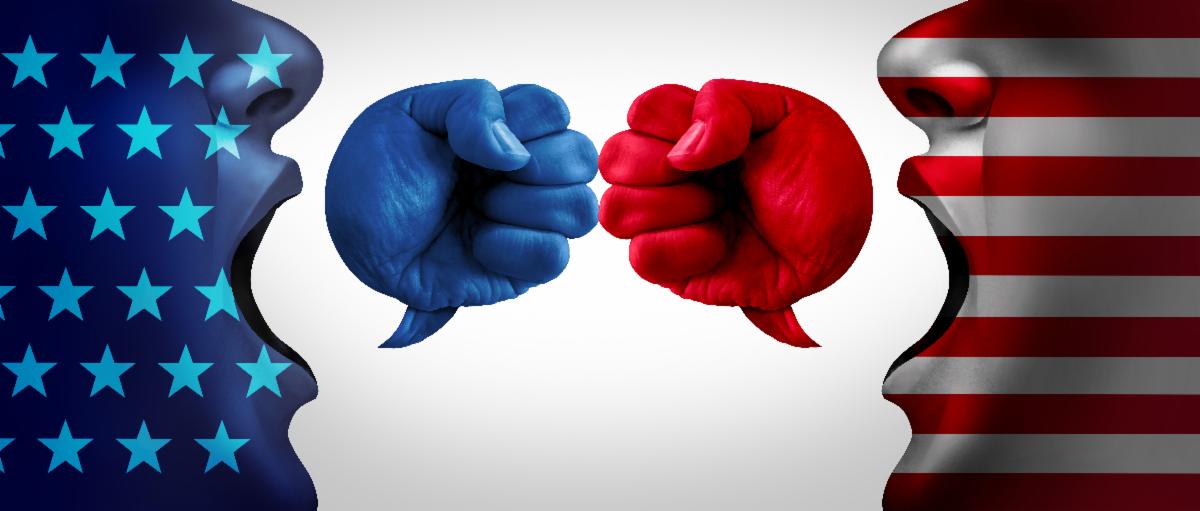Welcome to a new edition of The Weekender… where supply chain issues threaten our Thanksgiving gatherings and Black Friday sales. Also, it was a rough week for Democratic issues on ballots nationwide – what does this mean for upcoming elections? Plus, billionaires are racing each other to build space stations, and we take the time to consider one of the biggest problems facing our veterans. Read these stories and more in this edition of The Weekender. Thanks for joining us.
P.S. Veterans Day falls before the next edition of The Weekender, so we would like to pause for a moment and thank all those who have served in the military or are currently serving. You represent the very best of America, and we sincerely appreciate all that you have sacrificed to protect and defend our nation. We would not be the home of the brave and the land of the free without you. Thank you, and happy Veterans Day.
THE BIG FIVE
A new question has fanned the fight over a vaccine mandate back into flames: Should students be required to receive COVID-19 vaccines to learn in person? Some school districts are arguing yes, with 350,000 California students being given a choice between leaving the classroom or getting vaccinated. Some cities like Philadelphia require student-athletes to be vaccinated. Since COVID-19 vaccines have officially been cleared for use with children ages 5 to 11 years old, the number of school districts requiring vaccination will likely start to climb. Some states are already pushing back on this possibility, including Tennessee, where schools are banned from mandating COVID-19 vaccines. While most of the fighting over vaccine mandates has been played out among adults, the lines between the supportive and the skeptical blur for parents of children receiving injections. A recent poll from Kaiser Family Foundation finds that only 34 percent of parents to children who are now vaccine eligible plan to vaccinate immediately, while 32 percent are waiting to see, and the rest of respondents do not plan on vaccinating their kids against COVID-19. The history of required vaccines for education is long and complex. Still, officials are scrambling to encourage vaccination, including vaccinating children on live TV. Will unique tactics like needles and live TV dissuade hesitancy among parents? Only time will tell. Read more in POLITICO.
Gubernatorial races offer commentary on the next few years of political showdowns
Virginia has been trending increasingly blue for years. You can imagine the nation’s shock following the results of Tuesday night’s gubernatorial election when Glenn Youngkin became the first Republican to win a statewide race in Virginia in twelve years. Youngkin’s victory was not the only surprise – solidly blue New Jersey had a gubernatorial race so tight that Democratic incumbent Governor Phil Murphy was only declared victor almost two days after the polls closed. Add that to the list of school board district races, ballot measures, and other local decisions that were swayed right, and Election Day this year did not look too favorably on Democrats. Why the results? One factor is undoubtedly the will of the voters to rebuke U.S. President Joe Biden and members of the Democratic party at the ballot box. Considering President Biden’s drop in favorability ratings, Democrats are not standing in the same position in Virginia they were a year ago when Biden beat Trump by 10 points. Perhaps a more significant factor in play is the nationalization of local races. “All politics is local politics” seems to now be a thing of the past as every ballot measure, mayoral race, and school board election has the potential to make national news. It is easier than ever to form national coalitions and weigh in on races in different states in our digital age. In turn, these races can easily have a ripple effect on state and local politics nationwide. What does this mean for Democrats and the White House as we approach midterm elections and look down the road to 2024? While nothing is set in stone, the party certainly has work to do in winning over voters. Read more in the New York Times.
Inflation and the supply chain take over the pandemic’s role in disrupting Thanksgiving
Amid all of the warnings from businesses to start Christmas shopping now to hopefully avoid problems prompted by the supply chain and inflation, many are left wondering how the pandemic will impact the holidays happening right around the corner: Thanksgiving and Black Friday. For starters, everything is going to be more expensive. From that turkey on your table to the shoes you’re eyeing in your online shopping cart, shipping delays and rising prices have left no celebratory stone unturned. While inflation and supply chain issues impact what is presented on the Thanksgiving table and on store shelves, in-person gatherings will likely start to rebound with the prevalence of the COVID-19 vaccine and booster shots. Though some families may be missing their favorite dishes and work hard to avoid the vaccine conversation around the Thanksgiving dinner table, many others are grateful to finally share some COVID-safe hugs with loved ones. Read more in the New York Times.
Houston, it’s getting crowded up here
The International Space Station (ISS) has always touted its exclusivity as the only fully operational and permanently inhabited space station in low Earth orbit. However, that is set to change due to – surprise! – the private space race. With their eyes set on space, Jeff Bezos, Elon Musk, and the other wealthy tycoons are not just vying for the most rocket launches. Instead, they are competing for the chance to partner with NASA and other players in the aeronautics industry to build space stations. While this seems like an unnecessary quest on a surface level, the timing is perfect. ISS operations are expected to end by 2030, and that deadline could be moved up. If the U.S. wants to continue having astronauts defying gravity (literally), living in space, and pushing extraterrestrial boundaries, it will need the private sector to roll up its sleeves and tackle these challenges. Read more in Axios.
Will new legislation help U.S. veterans receive healthcare (finally)?

INTERNATIONAL SPOTLIGHT
Two important countries glaringly absent in Glasgow
As world leaders, climate stakeholders, and private sector advocates flock to Glasgow, Scotland, for the COP26 (Conference of the Parties 26) climate summit, two countries have been noticeably absent from the discussions: Russia and China. Their absence has raised red flags over the future impact of summit outcomes, as the two countries are global population centers (China #1 and Russia #9) and heavy-hitting polluters (China #1 and Russia #4 in greenhouse gas emissions). Both Russia and China cited COVID-19 as the reason for not attending the summit. President Biden took the opportunity to criticize both leaders for their absence after a seemingly unproductive G-20 meeting. COP26 is not over, but questions remain. If two of the largest countries are not at the table, what can really be accomplished at a global summit? Read more in Fox News.
DATA POINTS
66%: The percentage of college students who voted in the presidential election last year, up 14 points from 2016. Experts say this could signal a surge in civic engagement as Gen Z comes of age.
5 million: The number of people worldwide who have died from COVID-19. The first known death from the global virus was announced on January 11, 2020. Now, nearly two years later, the U.S. tops the globe with almost 750,000 deaths.
90.3 million: The social media interactions per article about Facebook during the week of October 25th. The Facebook Papers and whistleblower accounts are proving to be public relations nightmares for the social media giant as the public is exiting out of the platform.
90: The number of countries who signed the U.S. and E.U.-sponsored Global Methane Pledge at the COP26 summit on Tuesday. Pledge signatories included 15 of the world’s top 30 methane emitters.
$68: The cost per megawatt-hour of solar electricity – the second cheapest form of electricity behind onshore wind. Solar energy cost has dropped over $300 over the past 10 years, making even more of a case for renewable energy generation in the U.S.
+1 hour: The time we’re gaining as daylight saving time ends on Sunday, November 7, and most of the U.S. “falls back” into decreased daylight hours.
199 years: The period of time the mayor of Boston was a white male. On Tuesday, Michelle Wu was elected as Boston’s mayor, becoming the first woman and person of color to hold the office.
36,053: The peak at which the Dow Jones Industrial Average closed on Tuesday; for the first time in its history, meeting James Glassman and Kevin Hassett’s predictions in their 1999 book “DOW 36,000.”
1995: The last time the Atlanta Braves won a World Series. Ending their streak on Tuesday night, the Braves closed out the Houston Astros 7-0 in Game 6 and took home the crown.
FEATURED TWEET
October 31 vs. November 1 pic.twitter.com/t8e4Tn0X9b
— Orlando Informer (@OrlandoInformer) November 1, 2021
Credit: Orlando Informer on Twitter.
To receive a copy of The Weekender every Friday in your inbox, sign up here. Be sure to follow us on Facebook, Twitter, and LinkedIn for more news and industry updates.







